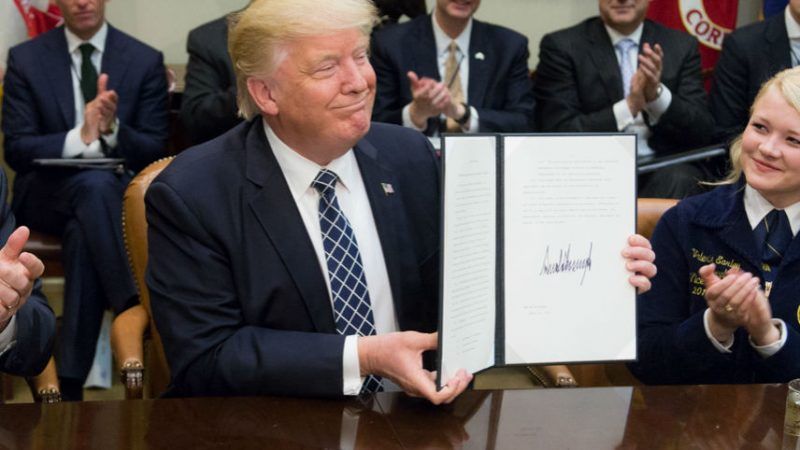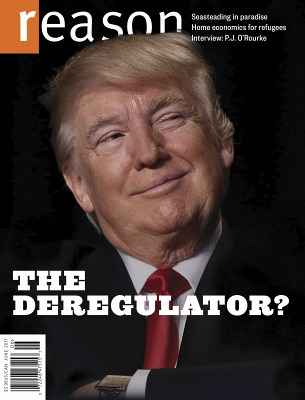Trump's Deregulatory 'Juggernaut'?
Regulatory slowdown/rollback continues apace, but real deregulation requires congressional courage.


"While the Republican machine that emerged from the 2016 election may be sputtering on other fronts," The Wall Street Journal's Gerald F. Seib wrote this week, "it is proving to be a juggernaut on deregulation." But is that really true?
Seib notes that a recent U.S. Chamber of Commerce survey shows (in his phrasing) "29 executive actions…to reduce regulatory requirements," "100 additional directives that either knock down regulations or begin a process to eliminate or shrink them," "almost 50 pieces of legislation that have been introduced or begun moving through Congress," plus the overturning of 14 end-of-term Barack Obama regulations via the Congressional Review Act (CRA).
He does not mention, though you can read all about it right here, that the Competitive Enterprise Institute one month ago issued a report at the Trump administration's nine-month mark concluding that he is "the least regulatory president of all," with significant ($100 million and up) regulations down 58 percent from Obama's first 9 months of 2016, and significant proposed rules down 77 percent.
Those numbers are real, and meaningful. But "deregulatory"?
Slowing down and even blocking regulation is not the same as removing human activity from regulatory oversight by the state. It's true, the CRA (on which more below) has been used 14 more times under Trump than during all previous presidents combined, but that's against a backdrop of 2,183 rules issued during Trump's first nine months. In truth, there's really only so much that even the most deregulatory-minded president can do (and Trump has plenty of regulatory impulses as well). Real deregulation, as I spelled out in this magazine feature, must come from Congress:
"What deregulation meant [back in the 1970s] was we altered statutes," [Regulation Editor Peter Van Doren] explains. "Congress rewrote the laws." It's the underlying legislation, which instructs regulatory agencies to spend money and promulgate rules, that needs to be repealed, not just the odd stinkbud blooming at the end of the process. Even radical-sounding proposals, like the one-sentence bill introduced in February by the libertarian-leaning Rep. Thomas Massie (R–Ky.) to close down the Department of Education, ultimately "doesn't do anything," Van Doren argues. "You know why? The statutes!"
If you don't want federal money to be spent on education, he says, "you have to rewrite and/or eliminate the Elementary Secondary Education Act of 1965.…The Department of Education simply implements the ESEA, so if you eliminate the implementer, the law still exists." ("It's a fair charge," Massie acknowledges. "I had to decide whether to write a one-sentence bill that I could get a lot of people to agree with, or a very involved bill that talks about what happens to all that funding, and then people start disagreeing.")
So has this Congress, which has shown tangible enthusiasm both for killing stinkbuds and debating process-reform bills, started the hard work of repealing the problematic underlying laws? I'll answer the question with another question: Is the indefensible Jones Act still gratuitously hobbling hurricane-ravaged Puerto Rico?
As Susan Dudley, the regulatory studies director at George Washington University and former administrator for the Office of Information and Regulatory Affairs, recently concluded, "Despite some promising bipartisan efforts, the 115th congress has failed to make much progress on regulatory reform legislation, and the opportunities for doing so are rapidly diminishing."
However, Dudley also reports on an interesting new CRA wrinkle that could swell the list of potentially reviewable regulations into the thousands:
The window for such disapprovals was widely thought to have closed in May, but just last week, congress showed that it is not ready to mothball the Congressional Review Act (CRA) yet. It disapproved a recent Consumer Financial Protection Bureau rule and sent it to the president's desk. Perhaps an even more significant sign that the CRA is still viable is a new Government Accountability Office (GAO) letter confirming that the law gives congress the ability to veto agency guidance documents….
The less-reported bit of news on this front came in the form of a letter from the GAO to Senator Pat Toomey (R-PA). Toomey asked whether a guidance on leveraged lending issued jointly more than four years ago by the Office of the Comptroller of the Currency, the Board of Governors of the Federal Reserve System and the Federal Deposit Insurance Corporation, was a "rule" for purposes of the CRA. The GAO responded on October 19 that it was.
As an earlier column (CRAzy After All These Years) observes, this opinion could put hundreds or even thousands of rules within the scope of congress's disapproval powers. This is because congress's 60 legislative-day review clock doesn't start ticking until a rule is published or until the issuing agency submits a report to the GAO, whichever comes later. As a former Congressional Research Service analyst documented, agencies neglected to submit reports to GAO for hundreds of rules since the CRA's passage in 1996. The broad definition of rule the GAO confirmed in the Toomey letter expands those numbers to thousands.
Perhaps even more interesting, according to the Wall Street Journal, "the Senate parliamentarian has found that the GAO ruling counts as the official report," triggering the review clock for the interagency leveraged lending guidance.
Editor's Note: As of February 29, 2024, commenting privileges on reason.com posts are limited to Reason Plus subscribers. Past commenters are grandfathered in for a temporary period. Subscribe here to preserve your ability to comment. Your Reason Plus subscription also gives you an ad-free version of reason.com, along with full access to the digital edition and archives of Reason magazine. We request that comments be civil and on-topic. We do not moderate or assume any responsibility for comments, which are owned by the readers who post them. Comments do not represent the views of reason.com or Reason Foundation. We reserve the right to delete any comment and ban commenters for any reason at any time. Comments may only be edited within 5 minutes of posting. Report abuses.
Please to post comments


I wonder if Trump will get credit for this with the Libertarian meanies.
There's actually people on here who think all this stuff Trump is doing to roll back government is random and not some kind of plan.
He definitely won't from the con artists running Reason, that's for sure.
Not one of these fugazi mofos ever bitched one time about the Jones Act or any other regulation when their hero Obama and the democrats controlled the entire government for a couple of years.
Well to be fair the Jones Act is older than any of us.
But yeah, Reason, due to them being beholden to Never-Trumpers (Kochs), will not give credit where it is due.
You can't have freedom without economic freedom. Trump is kicking ass on the economic freedom side of things.
"Regulatory slowdown/rollback continues apace, but real deregulation requires congressional courage."
While we wait for congress to get a spinal implant, we'll take what we can get.
"If you don't want federal money to be spent on education, he says, "you have to rewrite and/or eliminate the Elementary Secondary Education Act of 1965.?The Department of Education simply implements the ESEA, so if you eliminate the implementer, the law still exists."
Or you could try actually upholding the Constitution which never authorized the federal government to get involved in education at all to begin with. That law is therefore unconstitutional and should be ruled as such.
The CRA is the real litmus test of the gop congress. They have all of the tools they need to put a serious hurt on the socialist bureaucratic complex. Will they?
Thank you, President Trump!
No credit to the bombastic Reason contributors, who never thought of this simple angle of reducing regulation.
Something is wrong, where is the anger and insinuation that Trump is a dictator laying in wait. It almost seems like praise! Where is my little Shika, please let her re-write this article so we can get the proper perspective that Trump is an evil racist Troll.
Seriously Trump was a victim of the regulated state, these guys stick it to builders at every turn. Time to streamline the process!
"Seriously Trump was a victim of the regulated state, these guys stick it to builders at every turn"
I'm willing to back the guy when he does something good, but I'm no SIV. That's a hard sell you got right there:
"Donald Trump's history of eminent domain abuse"
[...]
"As Boaz notes, this was not the only time that Trump sought to use eminent domain to seize property from unwilling owners. In 1994, he also lobbied the city of Bridgeport to condemn five small businesses so he could build an office and entertainment complex that he absurdly claimed would turn Bridgeport into a "national tourist destination.""
https://www.washingtonpost. com/news/volokh-conspiracy/wp/2015/08/19 /donald-trumps-abuse-of-eminent- domain/?utm_term=.a6f68e50883e
"but real deregulation requires congressional courage."
Good one, I needed a laugh on this Friday afternoon. No one in congress, on either side, has the necessary courage.
yea i jus hoap trump gets ridda them regelations wut johnson made n the 60s wut made us hav to let niggers in are stores and restrants and drink frum are wite fowntans . gets ridda them regelations n i can open muself a nigger free restrant no niggers alowed! the govments gots to stop regelating are bisnesses nigger polisys !
I'm pretty sure that when you're sober, YOU don't even find this bullshit amusing.
Put down the bottle and step away from the keyboard.
Matt;
I think you missed one very important issue as far as this article on regulatory reform is concerned. That of authority.
If the legislative branch is relegated to the "enumerated powers" in the Article's and sections from the Constitution related to the Legislative Branch, and the first 10 Amendments are/were recognized as the LIMITS on what the Federal Government can legislate, decree, or "rule" on. Then, the first order of business would be to look at the legislation itself and see if it is even Constitutionally allowable.
Just because the legislative branch comes up with a bill and president signs it, does not make it Constitutionally viable nor allowable. That the so called "supreme court" does not seem to recognize their responsibility to make sure the crap from the other two branches meets the requirements of being within the Constitutional boundrys does not change what these people Oathed.
The Oath of Office is a swearing or affirming that they will abide by the Constitution "AS WRITTEN"! There particular feelings or opinions on the subject are just that. They, BY LAW, must abide by the Constitution, as written.
Remember, it takes a SUCCESSFUL AMENDMENT PROCESS to add to, subtract from, or alter the Constitution in any manner or form.
Put that in your article, for that is "THE LAW" (9th Amendment)!
imo for pcimo appimo appsnaptube for pcsnaptube app
imo for pcimo appimo appsnaptube for pcsnaptube app
How To Buy Tether
How To Buy Time New Bank
How To Buy TRON
How To Buy VeChain
How To Buy Verge
How To Buy Walton
How To Buy Zcash
Since the government is doing a nice job of providing an insurance policy against the claim of disasters like water, fire, hurricane, flood damage Glendale.